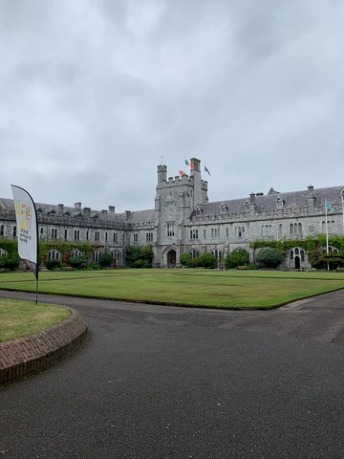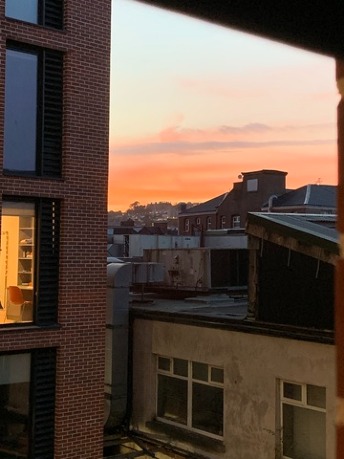Minor Abroad #1: How to prepare for a minor abroad (8 tips + my minor abroad in Cork, Ireland)
| Date: | 08 February 2023 |
| Author: | Hylke |

Are you interested in doing a minor abroad and want to know more about it? Or are you currently in the process of applying for a minor abroad, but don’t know what you can expect? This blog is for you! In the first part of our minor abroad-series, Hylke shares her experience of preparing for her Erasmus+ exchange to Cork, Ireland, while giving tips that will hopefully help you to prepare for your time abroad as well.

Hi, I’m Hylke! I’m currently a MA English Literature student. In the first semester of the third year of my Bachelor’s (September 2021 - December 2021), I went on a minor abroad to Cork in Ireland. Because of COVID-19, there was a lot of uncertainty whether I could go. Luckily, I could! While there were some regulations in place, I could go to in-person lectures and seminars all throughout the semester. It was such a great experience! I made lifelong (international) friends, saw some beautiful places and got to know the Irish language, history and culture. I can’t recommend going on a minor abroad enough! :)

#1 Start applying!
If you’ve already applied, you can skip this tip. But if you haven’t yet and want to, start applying now! Make sure to check which universities you can go to and select your top three. The offered destinations are different for every program. For instance, I really wanted to go to a university in London or somewhere in Scotland, but my programme didn’t offer these as destinations for an Erasmus+ exchange so I eventually chose to apply for Cork, Maynooth (a small university near Dublin, Ireland), and a university in Finland (just to switch things up).
When you have decided on your top three, you can start writing your motivation letters. Make sure to personalise them according to each destination. I did this by talking about certain courses I would have liked to take there and how they would have benefited my studies etc. I also talked about what I hoped to learn from this experience. Make sure to double check which documents you need for your application. Often, you need to submit motivation letters, a transcript of your records, your CV and a language certificate. But each faculty has different requirements. It’s also handy to check when the application deadline is! You don’t want to do all this work for nothing ;).
#2 Start gathering and uploading documents as early as you can
After you’ve been selected for one of your top-three destinations, it’s important to dive into the application process right away because there is a lot that has to be done before you go. Some steps take a lot of time because you have to wait for responses from the International Office or from your host university. For example, I had to officially apply to University College Cork (UCC, my host university), I had to have my Learning Agreement ready and signed by the UG and UCC (this is necessary if you apply to an Erasmus+ exchange, I don’t know how the application process goes for other exchange programmes such as Marco Polo), my scholarship (Erasmus+ grant) had to be calculated etc. In short, a lot has to be done and that’s why it’s important to start gathering and uploading the necessary documents as early as you can! I started soon after I knew I was selected for the minor abroad, but I was only done with everything in the middle of August–just a few weeks before I left for Cork. So start on time!

#3 Apply for accommodation early
Finding accommodation is an important step in the whole preparation process. I would suggest you start looking into it early because otherwise you might not be able to get accommodation through your host university and have to find something yourself. Personally, I could only apply for student accommodation provided by UCC after I had officially applied to them. So, it helped that I did that early because I got an offer while others, who had applied later, didn’t. They had to find accommodation themselves which wasn’t that easy.
I got an offer for Lee Point Cork at the beginning of June. Booking a room turned out to be a hassle because only the most expensive rooms were left and I had to pay the full amount immediately (so make sure to keep that in mind when booking your accommodation). I also needed a credit card to pay, which I didn’t have, so my father jumped in. While it was expensive, I did take the offer because I didn’t want to find something myself. In the end, the choice is up to you. Do you want to get rather expensive accommodation through your host university or try to find something yourself that might be a little bit cheaper? Whatever you decide, start looking into it early!
#4 Have patience
With that being said, it’s important to have patience. There are a lot of students going on an exchange so the UG’s International Office and your host university are bombarded with many emails. It’s normal that things take a little bit longer. I was fortunate enough that the exchange coordinators at UCC quickly responded to my emails, but I often had to wait a long time for responses from the UG’s International Office. That’s totally understandable, but make sure to send a follow-up email when it’s been longer than two weeks!
#5 Check your insurance
One of the most important things you have to do before you go on the exchange is to check if you are insured for all the necessary things. You probably already have health insurance (if not, arrange this immediately), but check if it only covers expenses in the Netherlands or in your host country as well (just call your health insurance, they can easily check it for you). It’s also good to have liability insurance for when you accidentally crash a football through a window (which hopefully won’t happen (;). You could even get travel insurance, but that’s not really a necessity. My health insurance covered health expenses in Ireland and I got liability insurance.
#6 Check if you need a passport or just an ID card + visa
This seems obvious, but it’s easy to forget for which countries you need a passport and for which you can use your ID card. So check it just to be sure! Also check whether you need a visa. Because I was going to Ireland, I could use my ID card. But as it would expire during my time there, I applied for a new passport before I went. So, also make sure to check the expiration date!
#7 Get a credit card
This was such a lifesafer for me! Beforehand, everyone I talked to said that I didn’t need a credit card because I could just use my debit card to pay for everything. But I’m glad that I did get a credit card, because I needed it for purchasing tickets to concerts and pubs, and for booking my trips around the country. Without it I couldn’t have done that, so I recommend you get one before you go.
#8 Save up money
Last but not least, save up some money before you go because an exchange can be very expensive (you can make it as expensive as you want though). Even with my Erasmus+ grant, the whole experience cost a lot because I wanted to enjoy myself, go on trips and go out with friends. After I knew I was selected to go abroad, I set aside a certain amount of money each month leading up to the exchange. I was also fortunate enough to have parents who were willing to pay for my accommodation, without them I couldn’t have gone on this trip. So I’m really grateful for them! :)
Hopefully this blog helps you prepare for your minor abroad a little bit better as you now know what you can generally expect from the whole process before going away. I really hope you get to go on an exchange to where you want to go and that everything will run smoothly! If you’ve done a minor abroad as well, share your experience and tips for the application process in the comments below! We’d love to read them. Stay tuned for part two about studying abroad + my experience of studying at UCC! :)
About the author

Hiya! :) I’m Hylke, a Dutch MA English Literature student. People often ask me if I’m Frisian, but sadly I’m not; I just have a Frisian name. I love reading, writing, meeting with friends, and the colour yellow, so much so that I take pictures of every yellow wall I can find!

